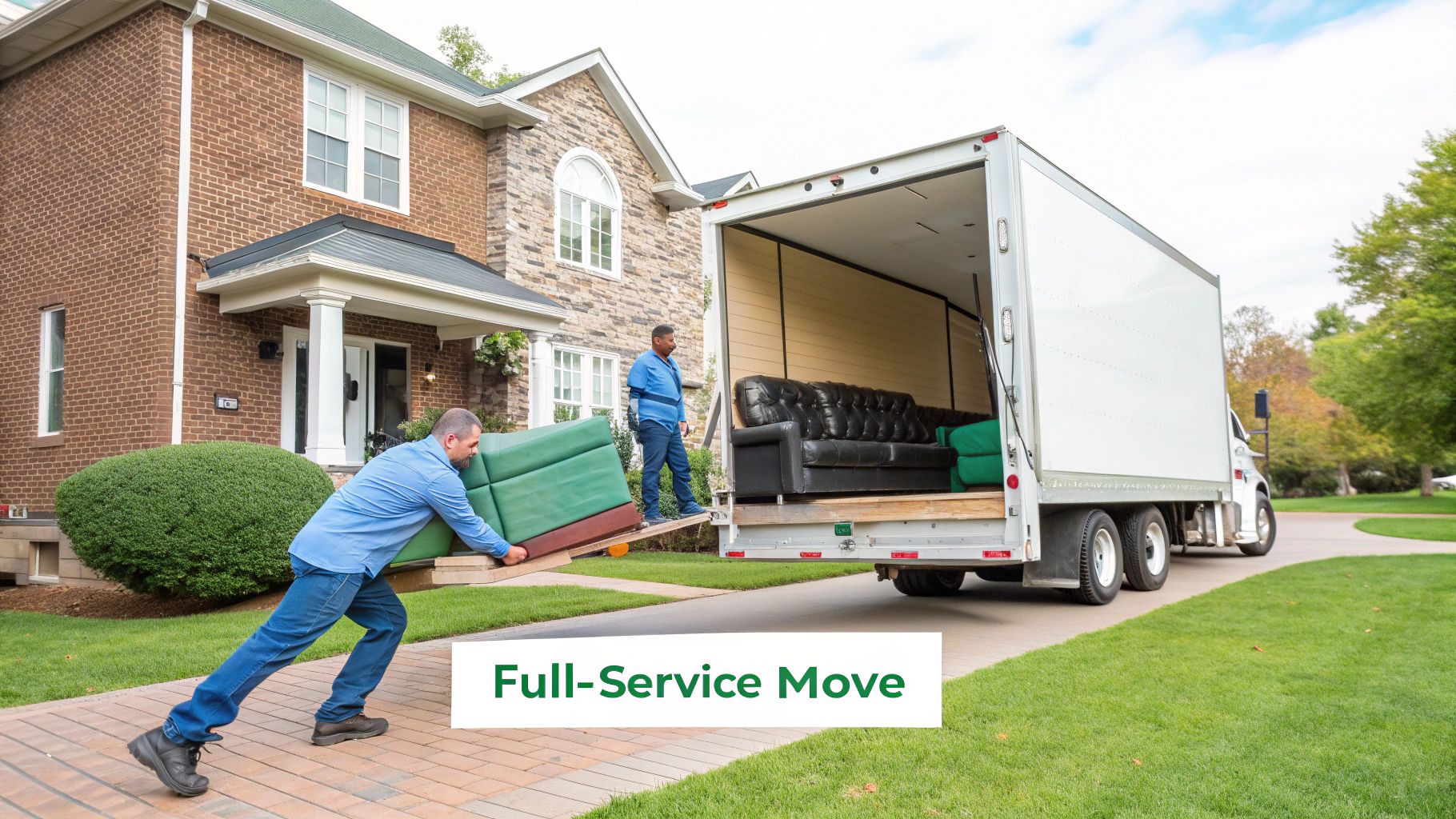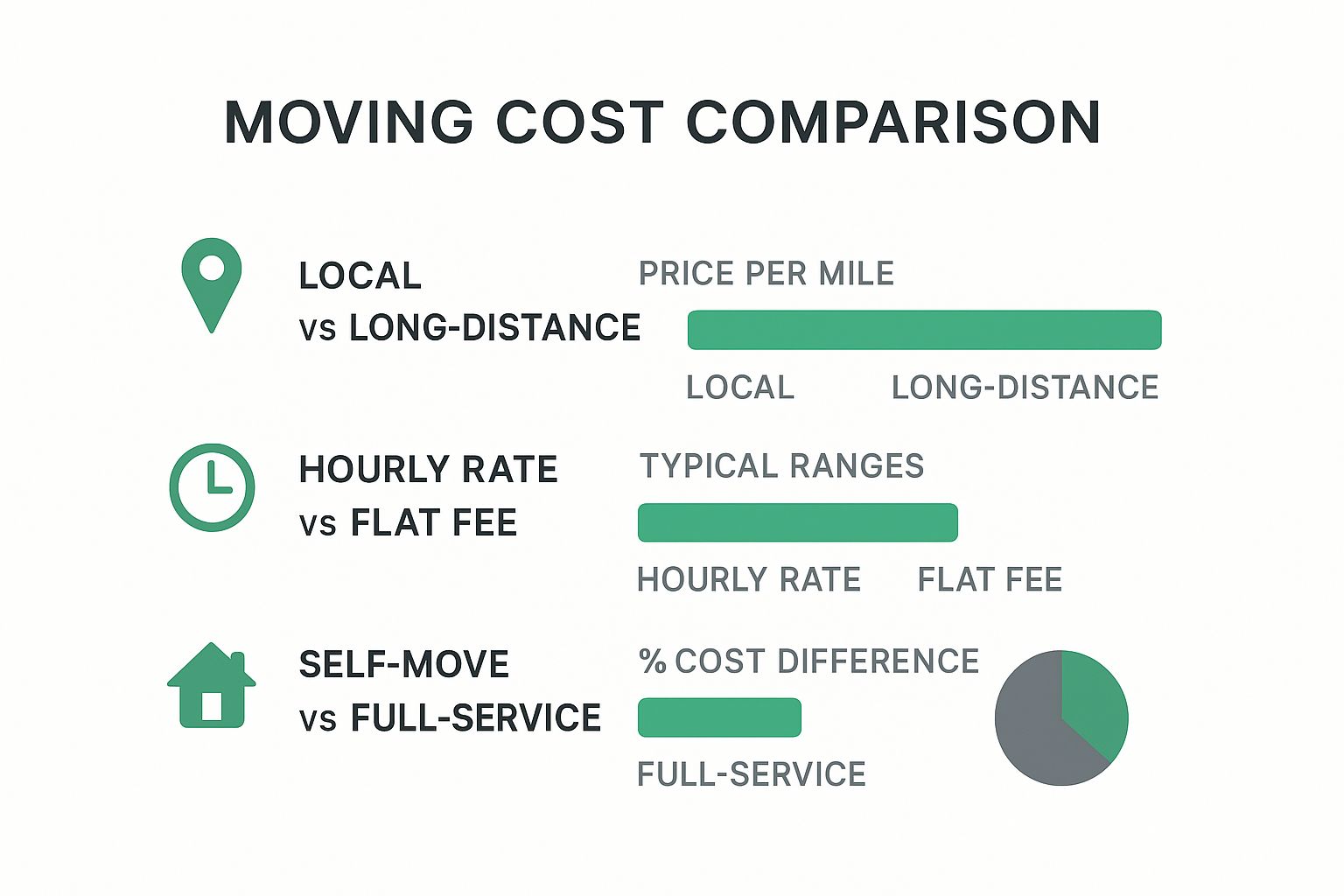When you're looking to hire movers in Perth, you can expect to pay anywhere from $350 for a small studio apartment up to $2,500 or more for a large family home for a local job. The price tag is almost always calculated by the hour, with most professional crews charging between $150 and $250 per hour for a team and their truck.
Understanding Perth Moving Costs
Think of the hourly rate as the starting block. It’s a bit like a taxi fare – there's a base rate, but the final bill really depends on how long the journey takes. Moving is no different. The total cost is a blend of the time it takes, the labour involved, and the sheer volume of stuff you have, which all dictates how many hours the movers will be on the clock.
If we zoom out and look at the national picture, the cost for professional movers varies quite a bit across Australia. For a typical local move in a major city, Aussies are often quoted between $470 and $1,350. This figure can swing depending on how much you own and whether you need extra help with things like packing. You can get a better sense of how these national averages stack up by exploring more detailed moving cost insights.
Ultimately, your final invoice is built on a few key components:
- The Hourly Rate: This is the core charge for the movers' expertise and their vehicle.
- Crew Size: A bigger team costs more per hour but can get the job done much faster. It's a trade-off.
- Your Home's Size: More bedrooms mean more furniture and more boxes, which naturally adds to the time.
- Total Time on the Job: The clock starts when the team arrives and doesn't stop until that last box is safely inside your new place.
Estimated Local Moving Costs in Perth by Home Size
So, what does that look like for a typical Perth home? We’ve put together a quick guide to give you a solid idea of what to budget for a local move. Think of this table as a starting point – it shows how the price generally scales up with the size of your property.
| Home Size (Bedrooms) | Average Hourly Rate (2 Movers + Truck) | Estimated Total Cost (Local Move) |
|---|---|---|
| Studio / 1 Bedroom | $150 – $180 per hour | $350 – $720 |
| 2 Bedrooms | $160 – $200 per hour | $640 – $1,200 |
| 3 Bedrooms | $180 – $220 per hour | $1,080 – $1,760 |
| 4+ Bedrooms | $200 – $250+ per hour | $1,600 – $2,500+ |
Keep in mind, these are just ballpark figures. In the next section, we’ll dive into the specific details that can push these numbers up or down, from tricky apartment access to the time of year you decide to move. Knowing these factors will put you in the driver's seat when it comes to managing your budget.
What Actually Determines Your Moving Quote?

Ever found yourself staring at two quotes for the exact same move, wondering how they could be so wildly different? It’s a common frustration. The reality is that the final bill from your removalist is much more than a simple hourly rate multiplied by the number of hours they were there.
Think of it less like a simple calculation and more like a recipe. The hourly rate is just one ingredient. Several other critical factors get mixed in, and understanding them is the key to knowing exactly what you're paying for.
The Volume of Your Belongings
The biggest piece of the pricing puzzle, without a doubt, is the sheer volume of your stuff. We're not just talking about the number of boxes, but the total physical space everything takes up in the truck. More belongings mean more time spent loading, more truck space needed, and sometimes, a bigger crew to get it all done.
This is exactly why moving a four-bedroom family home costs so much more than a one-bedroom apartment. A larger home is filled with more life—more furniture, more appliances, more memories, and all of it needs to be moved carefully. Professional movers measure this in cubic metres to accurately estimate the time and resources required.
Key Takeaway: The less you move, the less you pay. It sounds obvious, but this is why a serious declutter before you even ask for quotes is one of the best cost-saving moves you can make. Every item you sell, donate, or toss is one less thing adding to that final invoice.
For a better grasp of how these numbers add up, it's worth exploring the details of the average Perth removalists hourly rate. It gives you a solid look at the base costs before all the other variables come into play.
Property Access and Difficulty
So, how easy is it to get your couch from the lounge room to the back of the truck? This question of access has a massive impact on how long the job takes, which directly translates into cost.
Picture this: carrying a heavy sofa 10 metres across a flat, level driveway is one thing. Now, imagine wrestling that same sofa down three flights of narrow stairs, pivoting through a tight hallway, and then carrying it another 50 metres down the street because there’s no close parking. It’s a completely different ball game.
These access challenges are absolute time-killers, and when you're paying by the hour, time is literally money.
- Stairs and Lifts: A home with multiple storeys or an apartment without a lift will always take longer than a ground-floor job. Movers have to work slower and more deliberately to navigate stairs safely.
- Long Carries: If the truck can't park right at your doorstep, that extra walking distance adds up fast. Over dozens of trips back and forth, those extra minutes become hours.
- Awkward Layouts: Narrow hallways or tricky doorways that force movers to tilt, angle, or even partially disassemble furniture can add precious time to the clock for every single challenging item.
A good mover will ask about these things, but being upfront about any potential access headaches ensures your quote is accurate from the start.
Timing and Seasonality
Believe it or not, when you move can affect the price just as much as what you move. Just like any other service industry, the moving world has its peak and off-peak seasons, all driven by good old supply and demand.
Trying to book movers for a Saturday in summer is like trying to find a cheap flight at Christmas – everyone wants to do it, so prices are at a premium. On the flip side, scheduling your move for a Tuesday morning in May could land you a much better rate.
Keep these peak times in mind when you're planning:
- Weekends: Saturday is the most popular day of the week to move, and therefore the most expensive. Fridays and Sundays aren't far behind.
- End of the Month: Rental leases often tick over at the end of the month, creating a huge bottleneck of people all trying to move at once.
- School Holidays: Families with kids often aim to move during school holidays to avoid disrupting the school year, especially over the long summer break.
If you have some wiggle room in your schedule, locking in a mid-week, mid-month move outside of the holidays is one of the easiest ways to bring down the cost. That simple shift in timing can often save you hundreds.
How Local and Interstate Moving Costs Differ
When you start digging into moving costs, you’ll quickly find there isn't one single way companies calculate your bill. A move from Subiaco to Joondalup is a world away from a cross-country trek from Perth to Sydney, and the pricing reflects that. The two are completely different logistical puzzles.
Let's break down the two main pricing structures you'll encounter.
Local Moves: It’s All About the Clock
For any move within the Perth metro area, the maths is usually pretty simple. It almost always comes down to time. Removalists charge a set hourly rate that covers their crew and the truck, and that clock starts ticking from the moment they arrive until the last box is in your new home.
Think of it like hiring any other tradie – you're paying for their time and skilled labour. The less time they need, the less you pay.
So, what makes the clock run longer on a local move? A few common things:
- Furniture Wrangling: That big bed frame or flat-pack desk won't disassemble itself. The time spent taking things apart and putting them back together is all on the clock.
- Tricky Access: Got three flights of stairs? A long, winding driveway? If the crew has to navigate obstacles, it’s going to add a fair bit of time to the job.
- Your Readiness: If you’re still frantically taping up boxes when the movers arrive, you're paying them to stand around. Being 100% packed and ready to go is the best way to keep the hours down.
The takeaway here is that for local moves, you're in the driver's seat. The better prepared you are, the more efficient the team can be, and the friendlier the final bill will look.
Interstate Moves: A Game of Volume and Distance
Once your belongings are set to cross state lines, the hourly rate goes right out the window. It’s no longer relevant. Instead, the cost is built on two completely different factors: the volume of your stuff (measured in cubic metres) and the distance it has to travel.
Why the big change? Because a long-haul move is a much bigger operation. It involves massive line-haul trucks, fuel costs, potential storage stops, and coordinating teams in different cities. The pricing has to account for all that complexity.
Here’s what goes into an interstate quote:
- Cubic Metres (m³): This is the biggest piece of the puzzle. The removalist will do a detailed inventory of your home to calculate exactly how much space your life will take up in a shipping container or truck.
- Kilometres Travelled: It costs a lot more in fuel, driver wages, and truck maintenance to get your things from Perth to Brisbane than it does to get them to Melbourne. The distance is a major cost factor.
- Extra Services: Things like transporting your car, needing storage for a few weeks, or getting comprehensive insurance are usually itemised separately on an interstate quote.
This image gives a great visual breakdown of how the cost structures differ.

As you can see, local moves are all about time efficiency, while interstate moves are priced on the sheer logistics of space and distance.
To make this even clearer, let's compare the two side-by-side.
Local vs. Interstate Moving Cost Structures
Here's a quick look at how pricing is calculated depending on where you're headed.
| Factor | Local Move (Within Perth) | Interstate Move (From Perth) |
|---|---|---|
| Primary Cost Driver | Time (hourly rate) | Volume (cubic metres) & Distance (kilometres) |
| Bill Calculation | (Hourly Rate x Total Hours) + Call-out Fee | Fixed price based on inventory and destination |
| Key Influences | Preparation, property access, furniture disassembly | Amount of stuff you move, final destination |
| Typical Billing | Charged upon completion of the job | Often requires an upfront deposit with the balance due before delivery |
Essentially, the two systems are designed for entirely different challenges. A local move is a one-day project, while an interstate relocation is a multi-day logistical operation.
This is why interstate moves in Australia have such a wide cost range. The huge number of variables means a move between major cities can cost anywhere from $765 to over $7,000. This all depends on how big your household is, the exact volume of your goods, and whether you add services like professional packing. You can see a complete guide to these figures and get a better handle on the cost variations for moving house in Australia.
Ultimately, the first step to understanding your quote is knowing which type of move you're planning. If you're staying in Perth, focus on being organised to cut down the hours. If you're heading across the country, your best bet for saving money is to declutter and reduce the volume of things you take with you.
Avoiding the Hidden Costs of Moving

The first quote you get from a moving company is often just the opening act. It covers the bare-bones basics—a truck and the crew's time—but there are a handful of extra services and fees that can pop up on the final invoice, stretching your budget further than you anticipated. Getting a handle on these potential add-ons is the secret to creating a realistic budget and sidestepping that nasty shock on moving day.
Think of it like buying a car. The sticker price looks appealing, but it doesn’t include the fancy floor mats, the premium sound system, or the sunroof. In the same way, the cost of movers can quickly climb once you start adding the "optional extras" that are often essential for a smooth, stress-free move.
Unpacking Common Add-On Services
Many of the services that make a move genuinely easier aren't part of a standard hourly rate. These are the most common extras you’ll want to factor into your budget if you plan on using them.
- Professional Packing Services: This is the big one. Having movers professionally pack your entire home can add hundreds, sometimes thousands, of dollars to your bill. The trade-off? It saves you an enormous amount of time and hassle.
- Specialty Item Handling: Got a grand piano, a fragile antique clock, or a hefty slate pool table? Moving these items safely requires special equipment and skills, which always comes at an extra cost.
- Furniture Disassembly and Reassembly: That complex flat-pack wardrobe isn't going to take itself apart. Movers are happy to do it, but every minute they spend with an Allen key is time on the clock, pushing your final bill higher.
A common point of confusion is the 'back to base' fee. This charge covers the crew's travel time from their depot to your house and then from your new place back to their depot at the end of the day. It’s standard practice in the industry, so always ask if it's built into the hourly rate or billed separately.
It’s always a good idea to clarify which of these services you’ll need right from the start. That way, the removalist can give you a much more comprehensive and accurate estimate, preventing any misunderstandings down the line.
Spotting Potential Surcharges and Fees
Beyond optional services, certain logistical hurdles can trigger surcharges. These fees are simply to compensate the moving team for dealing with difficult conditions that go beyond what’s considered a standard job.
A few examples include:
- Difficult Access Fees: If your apartment is on the third floor with no lift, or if the truck can’t park reasonably close to your front door, you might face an extra charge for the added labour and time.
- Heavy or Bulky Item Surcharges: Some companies apply a one-off fee for exceptionally heavy items over a certain weight, like a huge safe or a solid marble tabletop, which need extra muscle or equipment.
- Last-Minute Booking Fees: Need to move tomorrow? Booking with less than a week's notice can sometimes come with a premium, especially during the busy season when demand is through the roof.
Getting your head around how these different factors affect the final price is key. For a more detailed breakdown of the foundational charges, you can learn more about the typical Perth removalists hourly rate and see how these extra fees stack on top.
The Non-Negotiable Cost of Transit Insurance
Perhaps the most crucial "hidden cost" is one you should never skip: transit insurance. Even the most reputable movers are human, and accidents can happen. Without proper insurance, your options are incredibly limited if your belongings are damaged or lost during the move.
The basic liability cover offered by removalists is often minimal, sometimes as low as a few dollars per kilogram. That's nowhere near enough to replace a smashed TV or a damaged antique.
Transit insurance is a separate policy that protects the actual financial value of your goods while they're in the removalist's hands. It’s a small price to pay for genuine peace of mind, ensuring you're not left with a massive replacement bill if the unexpected occurs. Always check the level of cover and read the policy details carefully.
Proven Ways to Lower Your Moving Expenses

Knowing what drives up moving costs is half the battle; the other half is actively finding ways to bring them down. The good news is, you have more control over the final bill than you might think. With some clever planning and a few smart decisions, you can easily keep hundreds of dollars in your pocket without skimping on service quality.
These aren't some well-guarded industry secrets. They're just practical, time-tested strategies that savvy movers use to their advantage. By focusing on efficiency and timing, you can directly tackle the two biggest cost factors in any local move: the sheer amount of stuff you have and the time it takes to move it.
Master the Art of the Pre-Move Purge
Without a doubt, the single best way to cut moving costs is surprisingly simple: move less stuff. Every book, chair, and kitchen gadget adds to the volume and weight of your move, which directly translates to more time spent loading and unloading the truck. When you're paying by the hour, every box you decide not to take is money saved.
Think about it this way: for every bulky armchair you sell or donate, you’re not just freeing up space. You're saving the money it would have cost for the crew to wrap it, carry it, load it, transport it, and place it in your new home. A thorough declutter isn't just about tidying up; it's a powerful budgeting tool.
Get started on this at least a month before moving day. Go room by room and be ruthless. Sort everything into three simple piles:
- Keep: The absolute essentials you can't live without.
- Sell or Donate: Good-quality items you no longer need. Think Facebook Marketplace, Gumtree, or your local Salvos.
- Discard: Anything broken, expired, or unusable.
This simple exercise ensures you’re only paying to transport the things you truly want and need, shaving precious time—and dollars—off the final invoice.
Schedule Your Move Strategically
In the moving game, timing is everything. Just like booking a holiday, the day you choose to move can have a huge impact on the price. Demand for removalists in Perth skyrockets at certain times, and where there's high demand, there are higher prices.
Pro Tip: Moving on a Tuesday or Wednesday in the middle of the month is almost always your cheapest bet. Demand hits a weekly low, so removalists are often more willing to offer a competitive rate to fill up their schedule.
On the flip side, weekends—especially Saturdays—are prime time and the most expensive. The end of the month is another peak period, as that’s when most rental leases are up. If you have any wiggle room in your schedule, avoiding these busy times is a dead-simple way to secure a better deal.
Compare Quotes Like an Expert
Everyone knows to get a few quotes, but the real skill lies in comparing them properly. The cheapest quote isn't automatically the best one. A price that seems too good to be true might be hiding a lack of insurance, sneaky hidden fees, or an inexperienced crew that takes twice as long.
When you're on the phone with potential movers, arm yourself with a few key questions to get the full picture.
- Is your quote a fixed price or an estimate? A fixed (or "binding") quote won't change, but an estimate can.
- What insurance is included? You need to know exactly how your belongings are covered if something goes wrong.
- Are there any other potential fees? Ask directly about extra charges for things like stairs, long walking distances from the truck, or "back-to-base" travel time.
By getting at least three detailed quotes and asking these questions, you can choose a reputable company that offers real value, not just a temptingly low price tag.
Answering Your Top Moving Cost Questions
Alright, let's tackle some of the common questions that pop up once you start digging into the details of your move. Getting your head around the big cost factors is a great start, but it's often the smaller details that can really impact your budget and your stress levels. Here are some straight-talking answers to the questions we hear all the time about the cost of movers in Perth, so you can plan your relocation like a pro.
Is It Really Cheaper to Move on a Weekday?
The short answer? A definite yes. The day you pick for your move plays a massive role in the final bill, and it all comes down to simple supply and demand.
Weekends are prime time. Everyone wants to move on a Saturday to avoid taking time off work, which means removalist companies are flat out. Naturally, this high demand lets them charge a premium. Come mid-week—think Tuesday, Wednesday, or Thursday—and things quieten down significantly. To keep their crews working and their trucks on the road, most moving companies will offer much better hourly rates or special deals for these off-peak days.
By shifting your move to the middle of the week, you could easily slash 15% to 30% off the total cost. Sure, it might mean using a day of annual leave, but saving a few hundred dollars often makes it a very smart trade-off.
How Should I Budget for Moving Insurance?
Think of moving insurance not as an optional extra, but as an essential part of your budget. It’s your safety net against what could be a huge financial hit. Even the most careful and professional movers can have an off day, and accidents, while rare, do happen. A single dropped box with your TV inside or a nasty scratch on an antique dresser could end up costing you far more to fix than the entire move itself.
It's a common mistake to rely on the basic liability cover that comes with the moving service. This is usually minimal and calculated by weight, which means it won't even come close to covering the real value of your things. You need to budget for proper transit insurance.
Here’s a practical way to figure it out:
- Do a quick inventory: Jot down your most valuable items—electronics, good furniture, art, etc.—and estimate what they'd cost to replace.
- Ask for a quote: Your chosen removalist can give you a quote for comprehensive transit insurance based on your inventory's value.
- Set the funds aside: As a rule of thumb, plan to set aside about 1-2% of the total estimated value of your goods. So, if your stuff is worth around $50,000, you should budget between $500 and $1,000 for full protection.
It’s a small price to pay for genuine peace of mind, knowing you're fully covered if something unexpected occurs.
When Is the Absolute Best Time to Book Movers?
Timing is everything if you want the best rates and your pick of reputable companies. The sweet spot for booking your movers is about four to six weeks before your move date.
Booking this far in advance gives you a huge advantage. You'll have a much better selection of available dates, making it easier to snag one of those cheaper mid-week slots. It also gives you plenty of breathing room to get a few different quotes without feeling pressured. Good movers with glowing reviews get booked up fast, especially during peak seasons like summer and around the school holidays.
Key Insight: Leaving it to the last minute—say, one or two weeks out—is asking for trouble. You’ll likely face higher prices and find that your options are seriously limited, potentially forcing you to go with a less-than-ideal company.
Planning ahead doesn't just help you manage the cost of movers; it takes a huge weight off your shoulders by locking in a crucial piece of the puzzle early on. For more expert tips on getting organised, you might find our guide on the top five questions about moving house answered by experts really helpful.
Are You Expected to Tip Removalists in Australia?
This one causes a lot of confusion, especially for people who've moved from countries where tipping is the norm. Here in Australia, things are much more laid-back. Tipping your removalists is not expected or required. They are paid a proper wage for their work, and the quote you receive is the full and final price.
That being said, if your crew does an absolutely stellar job—they’re extra careful, super efficient, or just great people who go the extra mile—a tip is always a genuinely appreciated way to say thanks for their hard work. There are no rules on how much; it's completely up to you.
Even if you don't give cash, other gestures go a long way. Offering cold drinks and a few snacks on a hot Perth day is a fantastic touch that will definitely be appreciated. A positive online review that mentions the crew by name is also an amazing way to recognise their great service.
Ready to take the guesswork out of your moving budget? Emmanuel Transport provides clear, upfront quotes with no hidden fees, so you know exactly what to expect. For a seamless and stress-free move in Perth, get your free, no-obligation quote today at https://emmanueltransport.net.au.













